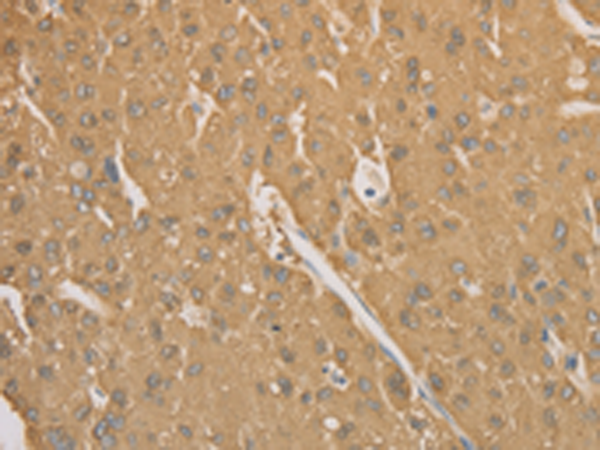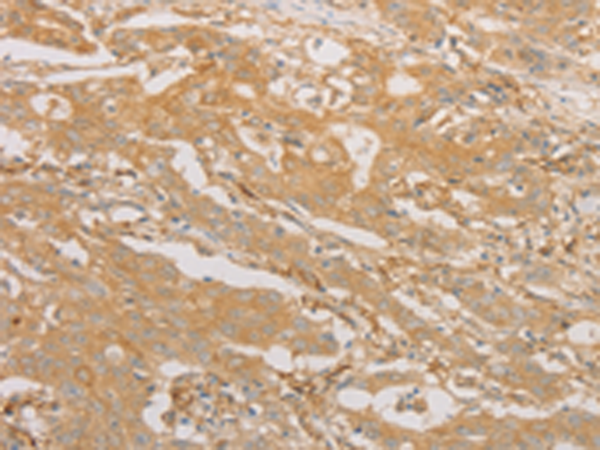

| WB | 咨询技术 | Human,Mouse,Rat |
| IF | 咨询技术 | Human,Mouse,Rat |
| IHC | 1/100-1/300 | Human,Mouse,Rat |
| ICC | 技术咨询 | Human,Mouse,Rat |
| FCM | 咨询技术 | Human,Mouse,Rat |
| Elisa | 1/2000-1/10000 | Human,Mouse,Rat |
| Aliases | p50; Bp50; CDW40; TNFRSF5 |
| Host/Isotype | Rabbit IgG |
| Antibody Type | Primary antibody |
| Storage | Store at 4°C short term. Aliquot and store at -20°C long term. Avoid freeze/thaw cycles. |
| Species Reactivity | Human, Mouse |
| Immunogen | Synthetic peptide of human CD40 |
| Formulation | Purified antibody in PBS with 0.05% sodium azide and 50% glycerol. |
+ +
以下是3篇关于CD40抗体的代表性文献及其核心内容概括:
1. **文献名称**: *Agonist CD40 antibodies induce cancer immune escape by activating PD-1/PD-L1 axis*
**作者**: Vonderheide RH, et al.
**摘要**: 该研究揭示激动型CD40抗体在激活抗肿瘤免疫的同时,可能通过上调肿瘤微环境中PD-1/PD-L1通路导致免疫逃逸,提出CD40抗体与PD-1/PD-L1抑制剂联合治疗的潜在必要性。
2. **文献名称**: *CD40 activation induces type 1 cytokine polarization and enhances T cell-mediated antitumor immunity*
**作者**: Melero I, et al.
**摘要**: 研究证明CD40激动型抗体通过促进树突状细胞成熟和Th1型细胞因子分泌,增强T细胞对肿瘤的特异性杀伤,为CD40抗体在实体瘤免疫治疗中的作用机制提供实验依据。
3. **文献名称**: *Phase I study of the CD40 agonist antibody CP-870.893 in combination with chemotherapy*
**作者**: Beatty GL, et al.
**摘要**: 该临床试验首次验证CD40激动剂CP-870.893联合化疗在晚期胰腺癌患者中的安全性,观察到部分患者出现肿瘤缩小,提示CD40抗体具有协同化疗增强抗肿瘤应答的潜力。
注:以上为基于真实研究的概括性描述,实际引用时需核对原文详细信息(期刊名称、卷期页码等)。建议通过PubMed或Web of Science平台以"CD40 antibody"为关键词筛选近五年高被引文献获取准确信息。
CD40. a member of the tumor necrosis factor receptor superfamily, is a co-stimulatory protein expressed on antigen-presenting cells (APCs), B cells, and some non-immune cells. Its interaction with CD40 ligand (CD40L/CD154) on T cells is critical for adaptive immune activation, including antibody class switching, germinal center formation, and T-cell priming. Dysregulated CD40 signaling is implicated in autoimmune diseases, cancer, and transplant rejection, making it a therapeutic target.
CD40-targeting antibodies are broadly categorized as agonistic or antagonistic. Agonistic CD40 antibodies (e.g., sotigalimab, selicrelumab) mimic CD40L activity to enhance anti-tumor immunity by activating APCs, promoting cytotoxic T-cell responses, and reprogramming immunosuppressive tumor microenvironments. They are being tested in cancer immunotherapy, often combined with checkpoint inhibitors or chemotherapy. Conversely, antagonistic CD40 antibodies (e.g., iscalimab) block CD40-CD40L interactions to suppress overactive immune responses in autoimmune conditions like lupus or rheumatoid arthritis. They also show potential in preventing organ transplant rejection.
Clinical trials have demonstrated both promise and challenges. Agonists can induce potent anti-tumor effects but may trigger systemic inflammation or cytokine release syndrome. Antagonists risk immunosuppression-related complications. Research continues to optimize dosing, antibody engineering (e.g., Fc modifications for selective immune cell engagement), and combination strategies. Emerging approaches include bispecific antibodies and tumor-targeted CD40 activation to improve safety profiles. CD40 antibodies represent a versatile tool for immune modulation, bridging innate and adaptive immunity in therapeutic applications.
×